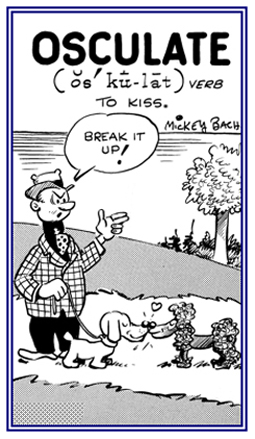1. Impregnation or fertilization by external contact, without intromission (insertion or introduction of one part into another): Apparently most fish reproduce by adosculations.
2. In botany, plants reproduce by wind-pollination: The adosculations involve the falling of pollen on the pistils or the female ovule-bearing parts of flowers in order to fertilize the seeds for reprouction.
2. In botany, plants reproduce by wind-pollination: The adosculations involve the falling of pollen on the pistils or the female ovule-bearing parts of flowers in order to fertilize the seeds for reprouction.
deosculate (verb), deosculates; deosculated; deosculating
To kiss affectionately or warmly: Whenever Eve's little children came home from school, she would hug them and deosculate each one because she was so glad to have them back with her again.
exosculate (noun), exosculates; exosculated; exosculating
To kiss; especially, to kiss repeatedly or with fondness.
inosculate (verb), inosculates; inosculated; inosculating
To join and blend with something else, or to join or blend one thing with another: Sometimes doctors inosculate a patient's blood vessels, nerve fibers, or ducts with small openings so he or she can physically function better.
Dr. Brown was surgically inosculating the blood vessels of the patient in order for her to recover from her lack of freely flowing blood in her legs.
When blood vessels are blocked by a blood clot or by fat deposits, surgery may be necessary: An inosculation can be performed to remove the blockage and directly connect the two ends of the arteries together.
A medical inosculation to bypass the blockage may also be performed by joining a synthetic substitute or a section of a vein from the patient to the artery above and below the obstruction.
interosculant (adjective), more interosculant, most interosculant
1. Mutually touching or intersecting; as, interosculant circles.
2. Uniting two groups; said of certain genera which connect family groups, or of species that connect genera.
2. Uniting two groups; said of certain genera which connect family groups, or of species that connect genera.
interosculate (verb), interosculates; interosculated; interosculating
1. To kiss together, to touch.
2. To have the character of, or to lie between, two distinct groups.
3. To form a connecting link, as between objects, genera, etc.
4. Etymology: from Latin osculat-, "kissed"; from the verb osculari, from osculum, "little mouth" or "kiss".
2. To have the character of, or to lie between, two distinct groups.
3. To form a connecting link, as between objects, genera, etc.
4. Etymology: from Latin osculat-, "kissed"; from the verb osculari, from osculum, "little mouth" or "kiss".
osculant (adjective), more osculant, most osculant
1. Meeting, kissing, and clinging to another person.
2. A reference to a close embrace or long kiss.
3. Adhering closely; embracing; applied to certain creeping animals; such as, caterpillars.
4. Intermediate in character, or on the border, between two genera, groups, families, etc, of animals or plants, and partaking somewhat of the characters of each, thus forming a connecting link.
2. A reference to a close embrace or long kiss.
3. Adhering closely; embracing; applied to certain creeping animals; such as, caterpillars.
4. Intermediate in character, or on the border, between two genera, groups, families, etc, of animals or plants, and partaking somewhat of the characters of each, thus forming a connecting link.
A dread of kissing or being kissed: After learning about different diseases that can be passed on from one person to another, Grace developed osculaphobia because she was terribly afraid of catching an illness when caressing someone with her lips.
oscular (adjective), more oscular, most oscular
Relating to the mouth or activities of the mouth: such as, the lips of two people touching each others lips together: There was an oscular stimulation as Jack and Jill embraced and kissed each other.
osculate (verb), osculates; osculated; osculating
1. To touch with the lips by pressing them against another person's lips or to kiss another part of the body as an expression of love, greeting, etc.: The newly married couple osculated each other when they were pronounced "husband and wife".

© ALL rights are reserved.
Go to this Word A Day Revisited Index
Little Patrick's grandmother always osculates him on the forehead when she comes to visit his family.
2. From Latin osculari, from osculum, "kiss"; literally, "little mouth" diminutive of os, "mouth".
Go to this Word A Day Revisited Index
so you can see more of Mickey Bach's cartoons.
1. The act of touching each others lips together.
2. In mathematics, a contact, as between two curves or surfaces, at three or more common points.
2. In mathematics, a contact, as between two curves or surfaces, at three or more common points.
A person who kisses very often: Congressman Peterson is a politician who is known as an inveterate osculator of babies on their cheeks."
osculatory (adjective), more osculatory, most osculatory
1. Of or pertaining to the act of kissing: The osculatory ceremony when couples at the end of the wedding ceremony.
2. In church history, a reference to a tablet or board, with the picture of Christ or the virgin, etc. which is kissed by the priest and then delivered to the people for the same purpose.
3. In geometry, relating to a circle that has the same curvature with any other curve at any given point.
2. In church history, a reference to a tablet or board, with the picture of Christ or the virgin, etc. which is kissed by the priest and then delivered to the people for the same purpose.
3. In geometry, relating to a circle that has the same curvature with any other curve at any given point.
Other "kissing" words: philema-.
Showing page 1 out of 2 pages of 17 main-word entries or main-word-entry groups.

